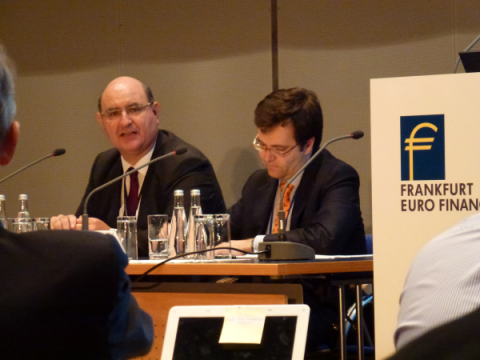Solvency II Wire can reveal the state of transposition of the Directive into national law.
Fully transposed – 18 Member States Austria, Croatia, Estonia, Finland, France, Germany, Ireland, Italy, Latvia, Luxembourg, Netherlands, Portugal, Romania, Slovakia, Slovenia, Spain, Sweden, United Kingdom (plus Gibraltar)
Partially transposed – 7 Member States Belgium, Czech Republic, Denmark, Hungary, Malta, Lithuania, Poland
Not transposed – 3 Member States Bulgaria, Greece and Cyprus

The information is based on data from the EUR-Lex legislative database (at the time of writing), Solvency II Wire analysis conducted in June 2015, and additional data from official and industry sources.
The June analysis revealed the state of transposition across Europe for the first time, showing that a mere seven Member States had met the 31 March transposition deadline. Although the majority of Member States missed the transposition deadline, most were on track to complete the work during the remaining course of the year.
However, on 19 November the Commission issued formal infringement proceedings against Bulgaria, Greece, Luxembourg, Slovenia and Sweden; the following month (10/12/2015) Cyprus was added to the list. According to the Commission notice the six countries: “failed to notify the Commission of measures to implement these rules into their national law.”
Member States have two months to respond to the Commission’s notice, which followed an initial notification in May 2015. The notice concludes: “If they do not comply within two months, the Commission may decide to refer these Member States to the Court of Justice of the EU.”
What is an infringement procedure?
An infringement procedure can be opened against a Member State for an alleged violation of an obligation under any of the European Treaties (as set out in Article 258 of the Treaty on the Functioning of the European Union (TFEU)). It consists of three phases: an informal phase, a formal phase, and judiciary phase.
In the first ‘informal’ phase the Commission initiates an investigation where there is suspicion of a breach of EU law. If it concludes that an infringement is likely, the Commission will request information from the Member State in the form of a “Letter of Formal Notice”, to which the Member State must respond within a specified period, usually two months.
These letters were issued in May this year, following disclosure in March that only seven Member States were on track to meet the 31 March transposition deadline. If the Member State fails to satisfy the Commission that it is able to fulfil its obligations, the proceeding enters its ‘formal phase’.
The Commission issues a “Reasoned Opinion”, which calls on the Member State to inform the Commission of the measures it has taken to comply with the law within a specified period (usually two months). This is the notice that was issued to the six Member States in November and December.
If the Member State has not complied within the specified period, the Commission may begin proceedings at the European Court of Justice (CJEU) for a final ruling. If the violation of the EU law is proved, the court will specify which acts are the sources of the violation and what fines and actions should be taken. Broadly speaking the Commission will only peruse this path once all other alternative resolutions have been exhausted (for example, direct dialogue with the Member State).
Where are we now?
Of the 6 Member States that were issued with a reasoned opinion, 3 (Luxembourg, Slovenia and Sweden) have now fully transposed the Directive, while questions remain about the state of transposition in the other 3 (Bulgaria, Cyprus and Greece).
Luxembourg
Luxembourg submitted the necessary documents to the EUR-Lex legislative database on 9 December 2015 and these appear to be the complete package of measures. It is therefore likely the Commission will drop proceedings against Luxembourg.
Slovenia

Although Slovenia had not submitted any documents to EUR-Lex at the time of writing, the NCA confirmed that the legislation was now in place and the Commission action was a result of delays to the legislative process.
According to an industry source, the Slovenian Parliament only adopted the new Insurance Act, transposing Solvency II Directive into national law, in November 2015. The law was published on 7 December and will be in force from 1 January 2016. The associated sub-legislations are mostly drafted but can only be published 15 days after the publication of the main legislation; it is expected this will happen during the first quarter of 2016.
The source estimates that one of the reasons infringement proceedings were started was that Slovenia did not implement any transitional legislation during the preparatory phase, which together with the delay in publication of the Insurance Act, may have prompted the Commission to begin proceedings. Despite the delays to the legislative process the Slovenian insurance industry has made on-going progress towards Solvency II.
According to the source, the regulator conducted a number of surveys on preparation and has engaged firms and senior management through a series of interview and update letters as well as compliance with the EIOPA interim guidelines. It is therefore likely the Commission will drop the infringement proceedings against Slovenia.
Sweden
Sweden submitted the necessary documents on EUR-Lex on 9 December 2015 and therefore appears to have now completed transposition. According to an industry source the Swedish government forwarded the respective bill to the Parliament in mid-September and it was adopted on 18 November. The amendments to the Insurance Business Act applying Solvency II were published on the 1 December 2015.
The source explained that some requirements of the directive were delegated to the Swedish NCA (Finansinspektionen) to regulate. The Finansinspektionen took their decision on the main regulation on the 25 November and on the transitionals on the 14 December, publishing the outcomes on the 2 December and 15 December respectively. It is therefore likely infringement proceedings will be dropped.
Bulgaria

Bulgaria had not submitted any documents to EUR-Lex at the time of writing.
The NCA said it intends to comply with all the EIOPA interim Guidelines and it would comply with 77 individual Guidelines and intends to comply with the remaining 355 in the first set of Guidelines. Initial analysis of available data shows that it intends to comply with most of the second set.
For each of the ‘comply’ response the NCA said: “These guidelines were introduced in their entirety (sic) as obligatory practice for the staff of the Financial Supervision Commission through the decision referred to herein [names the relevant decision].”
For ‘intend do comply’ responses it said: “These Guidelines will be implemented by an Ordinance of the Financial Supervision Commission to be adopted no later than the date of implementation of the Solvency II Directive.”
Cyprus
At the time of writing Cyprus had not submitted any documents to EUR-Lex. According to an industry source, the draft law transposing Solvency II was sent to the Cypriot parliament in October 2015. However, other priorities mean the law is unlikely to pass before the end of the year. The source expressed confidence the legislation will be passed early in the new year.
Cyprus complied with all the EIOPA interim Guidelines and the NCA said it would comply with all 432 individual Guidelines in the first set of Guidelines. Initial analysis of available data shows that it will comply with most of the second set of Guidelines as well.
Greece
Greece has not submitted any documents to EUR-Lex at the time of writing. According to an industry source, the Greek parliament is focused on the associated legislation of the Memorandum Agreement of the recent bailout agreement and there was currently no formal update on when the draft law transposing Solvency II will be discussed in the Greek Parliament.
Greece complied with almost all the EIOPA interim Guidelines, and the NCA said it would comply with all 432 individual Guidelines in the first set of Guidelines. Initial analysis of available data shows that it intends to comply with of the second set.
Further details of the state of transposition in each Member States can be found on the Solvency II interactive implementation map.
The likelihood of prosecution
The likelihood of prosecution is quite low given the amount of discretion the Commission has at each phase of the process, its tendency towards negotiated solutions and the protracted nature of the legal process.
The implication of late transposition is that the existing national law regulating the insurance sector is still (technically) in force, unless a particular area is covered by a Level 2 Delegated Act, which directly applies and does not require transposition.
According to the general principles of EU law and the settled CJEU case law, a late or incorrect transposition of a European directive may give rise to claims by an individual or a firm in the national courts and the CJEU. Such a claim could either be made against the state or against another party. At this point it is too early to speculate on the likelihood of any legal action by the Commission.
Partial transposition
Seven Member States appear to have only partially transposed the Directive into national law.
For example, Belgium submitted one document to EUR-Lex in April 2014 in which it noted that it did not relate to the transposition of the Omnibus II Directive (amending Solvency II).
Denmark has not submitted any documents to the database but it is well know that the Danish market and regulator are well prepared for Solvency II. According to an industry source it is unlikely the missing implementing acts are unlikely to be published before the end of the year, something the NCA is likely to take into account until the law is fully in force.
Answers to the great unknowns

On the eve of entry into force of Solvency II, the majority of Member States have transposed the Directive into national law. There are, however, a number of areas where that Directive has not been fully transposed or, in the case of Bulgaria, Cyprus, and Greece, no transposition has taken place.
But despite some delays to the legal process, analysis of responses to the EIOPA Guidelines shows that the NCAs in these countries have been making progress towards implementing Solvency II.
Quite what the impact of this uneven transposition will be, will be revealed, alongside all the other big unknowns of Solvency, II from 1 January 2016.





